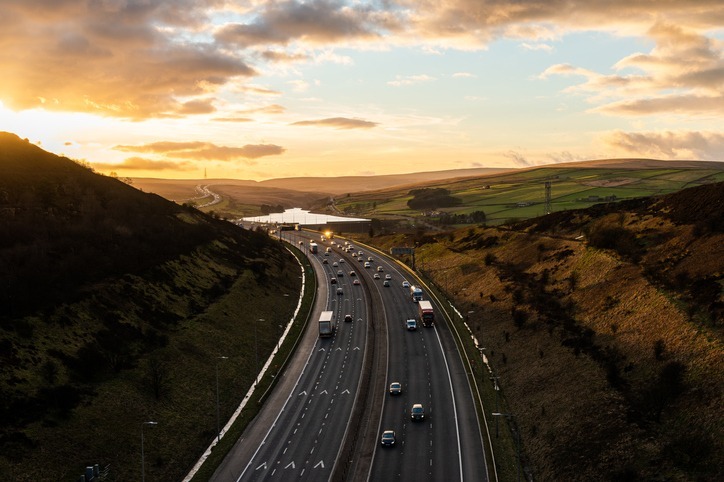Highways England has unveiled its roadmap to net zero by 2050. The transport agency, responsible for roads across England, will look to decarbonise motorways and A-roads.
The new plan builds on the agency’s work in reducing carbon output since 2015. It sets out a comprehensive roadmap to rapidly decarbonise the strategic-road network (SRN) in England. This will help the country to meet its climate targets, as it looks towards a net-zero future.
While much is made of the need to reduce fleet emissions or cut carbon output in manufacturing, road networks will also play a crucial part in reducing overall pollution from the automotive industry. Maintaining these networks goes alongside the power consumption for lighting and services in causing high-emission output.
Highways England plans to achieve decarbonisation through three key commitments; achieving net zero for its own operations by 2030, delivering net-zero road maintenance and construction by 2040, and supporting net-zero carbon travel on roads by 2050.
Contractors and suppliers will also be required to act, including commitments to reduce carbon year on year using the latest technologies so that by 2040 road maintenance and construction are near-zero emissions.
The future of road travel is a zero-carbon one, powered by renewable electricity, hydrogen and biofuels.
Net zero highways: Our 2030/2040/2050 plan
Highways England has been progressing with its net-zero plans for some time. The organisation has introduced plug-in hybrids (PHEVs) to its fleet, and installed LED lighting on the M62. It also used recycling and solar power for resurfacing on the A590.
The report highlights that while many see cars as a problem when it comes to the climate emergency, 80% of families in England own a car. Road travel will decarbonise fast, thanks to the rollout of battery-electric vehicles (BEVs) and the UK government’s plans to ban new petrol and diesel sales by 2030. The government’s Transport Decarbonisation Plan puts the country on a trajectory to do the same for heavy-goods vehicles from 2040.
‘Highways England recognises the threat of climate change and the risks it poses for us all. That is why we are pledging to take effective action to take carbon out of roads,’ said Nick Harris, acting chief executive of Highways England. ‘Today, roads are a convenient, efficient and low-cost way to travel, which is why nine out of 10 passenger miles and 79% of all freight moves on roads. Our plans set out how emissions from our own operations, our construction and our customers will reduce over the coming years.’
Achieving net zero
To achieve its aims, Highways England has set itself deadlines for various targets. By 2025, the organisation has made a Greening Government Commitment (GGC) to reduce its own carbon emissions by 75% compared with the 2017/18 baseline.
By 2030, the body will be net zero for its own emissions. This includes switching roadside lighting to LED – with a projection of 70% completion by 2027, changing its vehicle fleet to BEV models and planting up to three million trees. By 2040, all construction and maintenance activities on the SRN will be net zero.
In addition, in the next road period (2020-2025), the organisation will be taking steps to ensure zero-carbon transport can travel freely on the network. It will be increasing the charging infrastructure and create a blueprint of on-road services for electrically-chargeable vehicles (EVs). There will also be a training programme implemented to ensure traffic officers are able to stay safe when recovering broken down or crashed EVs.
Building the future
Construction and maintenance of the SRN is a large contributor to emissions. According to the report, around 734,000 tonnes of CO2 came from this area during 2020. Without additional action, this will drop to 350,000 tonnes by 2040.
But pushing for net zero offers the opportunity to push the construction industry to deliver on the Committee on Climate Change’s call for the construction industry to be largely decarbonised by 2040. Highways England will focus on the asphalt, cement and steel sectors to decarbonise the construction process. It will use a carbon-management system to embed approaches that minimise emissions, including lean construction practices and the principles of the circular economy. There is also the opportunity to use digital technologies to increase the capacity of its existing network minimising new construction.
‘Our members recognise their responsibilities to protect current and future generations from the impact of climate change,’ said Alasdair Reisner, chief executive at Civil Engineering Contractors Association (CECA). ‘How we build and maintain our roads naturally plays a key role in meeting net-zero goals. Roads form a critical backbone of the UK economy, supporting our personal journeys and contributing substantially to economic growth.
The issue of road building and its contribution to air pollution was highlighted recently by the Welsh government, which has cancelled all new road projects while it runs a review of the process.
The Wales New Transport Strategy, published earlier this year, included a modal shift target for the first time. This requires the country to aim for 45% of journeys to be by sustainable forms of transport by 2045, up from 32% currently. Ministers hope that by cancelling road building, for the time being, money can be shifted into public transport. Both these decisions will, it believes, help the shift to reductions in traffic, and therefore pollution.



 Close
Close